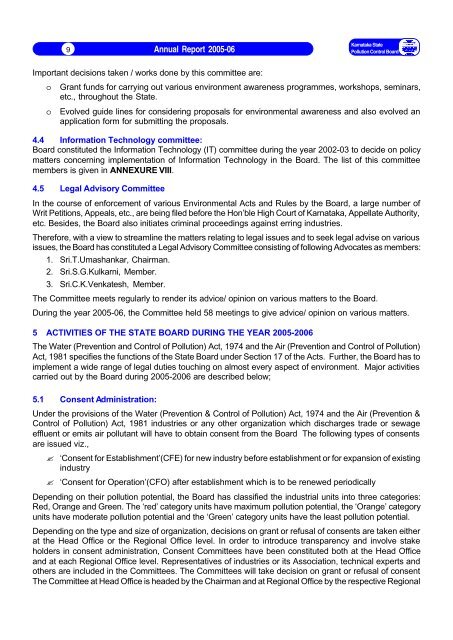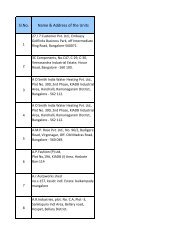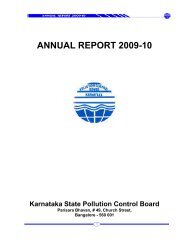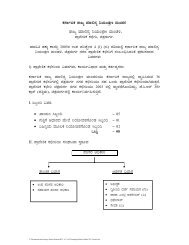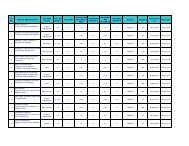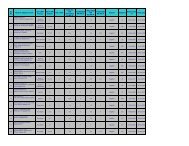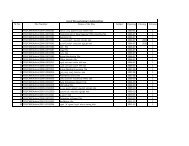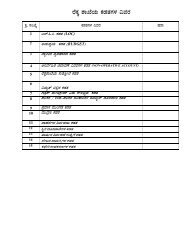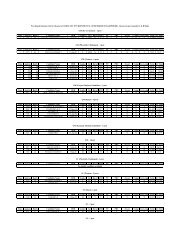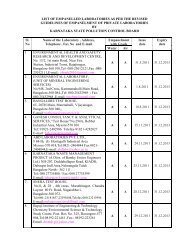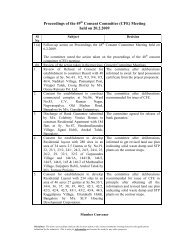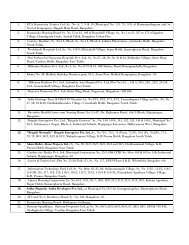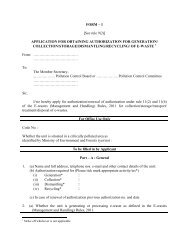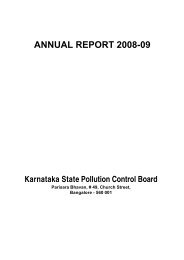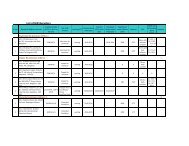Annual Report 2005-06 - Karnataka State Pollution Control Board
Annual Report 2005-06 - Karnataka State Pollution Control Board
Annual Report 2005-06 - Karnataka State Pollution Control Board
Create successful ePaper yourself
Turn your PDF publications into a flip-book with our unique Google optimized e-Paper software.
9 <strong>Annual</strong> <strong>Report</strong> <strong>2005</strong>-<strong>06</strong><br />
Important decisions taken / works done by this committee are:<br />
<strong>Karnataka</strong> <strong>State</strong><br />
<strong>Pollution</strong> <strong>Control</strong> <strong>Board</strong><br />
o Grant funds for carrying out various environment awareness programmes, workshops, seminars,<br />
etc., throughout the <strong>State</strong>.<br />
o Evolved guide lines for considering proposals for environmental awareness and also evolved an<br />
application form for submitting the proposals.<br />
4.4 Information Technology committee:<br />
<strong>Board</strong> constituted the Information Technology (IT) committee during the year 2002-03 to decide on policy<br />
matters concerning implementation of Information Technology in the <strong>Board</strong>. The list of this committee<br />
members is given in ANNEXURE VIII.<br />
4.5 Legal Advisory Committee<br />
In the course of enforcement of various Environmental Acts and Rules by the <strong>Board</strong>, a large number of<br />
Writ Petitions, Appeals, etc., are being filed before the Hon’ble High Court of <strong>Karnataka</strong>, Appellate Authority,<br />
etc. Besides, the <strong>Board</strong> also initiates criminal proceedings against erring industries.<br />
Therefore, with a view to streamline the matters relating to legal issues and to seek legal advise on various<br />
issues, the <strong>Board</strong> has constituted a Legal Advisory Committee consisting of following Advocates as members:<br />
1. Sri.T.Umashankar, Chairman.<br />
2. Sri.S.G.Kulkarni, Member.<br />
3. Sri.C.K.Venkatesh, Member.<br />
The Committee meets regularly to render its advice/ opinion on various matters to the <strong>Board</strong>.<br />
During the year <strong>2005</strong>-<strong>06</strong>, the Committee held 58 meetings to give advice/ opinion on various matters.<br />
5 ACTIVITIES OF THE STATE BOARD DURING THE YEAR <strong>2005</strong>-20<strong>06</strong><br />
The Water (Prevention and <strong>Control</strong> of <strong>Pollution</strong>) Act, 1974 and the Air (Prevention and <strong>Control</strong> of <strong>Pollution</strong>)<br />
Act, 1981 specifies the functions of the <strong>State</strong> <strong>Board</strong> under Section 17 of the Acts. Further, the <strong>Board</strong> has to<br />
implement a wide range of legal duties touching on almost every aspect of environment. Major activities<br />
carried out by the <strong>Board</strong> during <strong>2005</strong>-20<strong>06</strong> are described below;<br />
5.1 Consent Administration:<br />
Under the provisions of the Water (Prevention & <strong>Control</strong> of <strong>Pollution</strong>) Act, 1974 and the Air (Prevention &<br />
<strong>Control</strong> of <strong>Pollution</strong>) Act, 1981 industries or any other organization which discharges trade or sewage<br />
effluent or emits air pollutant will have to obtain consent from the <strong>Board</strong> The following types of consents<br />
are issued viz.,<br />
‘Consent for Establishment’(CFE) for new industry before establishment or for expansion of existing<br />
industry<br />
‘Consent for Operation’(CFO) after establishment which is to be renewed periodically<br />
Depending on their pollution potential, the <strong>Board</strong> has classified the industrial units into three categories:<br />
Red, Orange and Green. The ‘red’ category units have maximum pollution potential, the ‘Orange’ category<br />
units have moderate pollution potential and the ‘Green’ category units have the least pollution potential.<br />
Depending on the type and size of organization, decisions on grant or refusal of consents are taken either<br />
at the Head Office or the Regional Office level. In order to introduce transparency and involve stake<br />
holders in consent administration, Consent Committees have been constituted both at the Head Office<br />
and at each Regional Office level. Representatives of industries or its Association, technical experts and<br />
others are included in the Committees. The Committees will take decision on grant or refusal of consent<br />
The Committee at Head Office is headed by the Chairman and at Regional Office by the respective Regional


